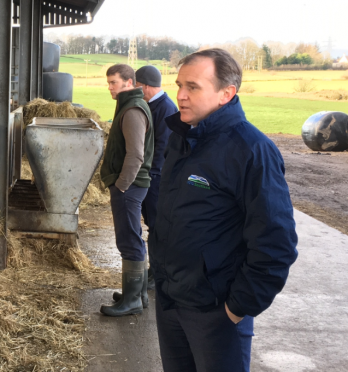The farming grandparents of Defra Minister George Eustice could provide the unlikely inspiration for Britain’s new agricultural policy, a dairy conference learned yesterday in Glasgow.
Mr Eustice appeared to hearken back to the good old days as he described the direction British farming needed to take in order to improve and protect the environment.
“It’s not about bolt-on cross-compliance measures, but going back to first principles with locally tailored schemes, possibly tailored round water catchments or landscape definitions,” he said.
“It’s a fusion of old-fashioned farm husbandry, crop husbandry and soil husbandry, the type of thing my grandparents might have done, but with the best genetics available today.”
Mr Eustice said he wanted to see improvements in the environment made by reintroducing livestock to the lowlands; reintroducing more rotation; and improving the amount of organic matter in soils – but all without compromises in yield.
Turning to dairy policy, he said the lessons learned during the downturn of the past two years needed to be “factored-in” when designing new policy out with the EU. In particular he said he wanted supply more chain fairness and market transparency.
Mr Eustice said that while so-called aligned dairy contracts had been popular with milk producers who had them, they had led to even greater misery for those who had no such luck. And he said that while B pool prices were effective in making farmers react quickly to market signals, they could be distorting and used as a” means of abuse” by disreputable processors.
“We need to question how they work and if they work equitably,” he said.
Mr Eustice later insisted that he was focusing on designing a UK-wide farm policy, with ‘discretion’ for the devolved administrations.
“I’m not looking to take away any powers that currently exist under devolution. The only issue in question is how we share the powers that return from Brussels that enables the devolved administrations to pursue policies that are right for their countryside and farmers,” he said.
“It wouldn’t work in the context of a UK single market if Wales or Scotland were paying huge headage subsidies to their lamb sector and placing Cumbrian sheep farmers at a massive disadvantage, so you’d need to have some sort of parameters to protect the integrity of the UK market.”
Mr Eustice said he would be having further discussions with his opposite numbers in Scotland, Wales and Ireland at the end of January. He later visited a mixed livestock and arable farm near Bridge of Weir
